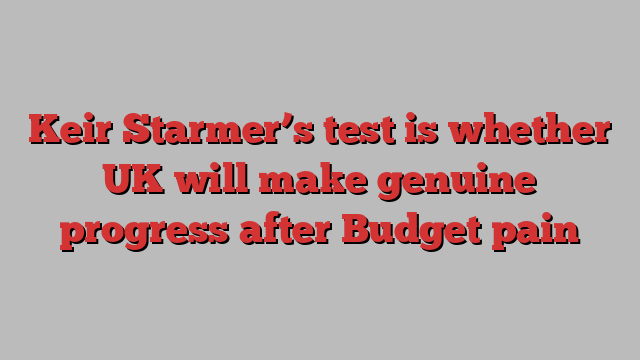
This article is an on-site version of our Inside Politics newsletter. Subscribers can sign up here to get the newsletter delivered every weekday. If you’re not a subscriber, you can still receive the newsletter free for 30 days
Good morning. Gloom today, victory in four to five years’ time? That’s the schedule Keir Starmer planned for in opposition and wants to repeat in government. Some thoughts on that in today’s note.
Inside Politics is edited by Georgina Quach. Read the previous edition of the newsletter here. Please send gossip, thoughts and feedback to [email protected]
Promises and the four Ps
Keir Starmer wants his first term as prime minister to have a similar shape to his tenure as leader of the opposition: an initial burst of enthusiasm following his election (remember the appointments of technocrats from outside politics, such as James Timpson as prisons minister and Patrick Vallance as science minister?), a series of tough and public rows, periods of real difficulty for his leadership, followed by a breakthrough in the polls and a big election win.
The core of the Starmer project in opposition was to make Labour non-threatening. If that sounds like damning with faint praise it is not intentional: Labour rarely clears this bar. Kicking out Jeremy Corbyn, changing the party’s rule book to shut out the party’s left from the leadership process, the intense management of the party’s selection processes, Starmer and Rachel Reeves’s wooing of business and their self-denying ordinances on income tax, national insurance and value added tax: these all shared the same purpose of constant reassurance.
Now he wants to do the same thing in turning around the UK’s public services. (If he were here, he would add “and economy”. Although the British economy is still bearing the scars of the financial crisis and Brexit, the economy already looks to be on the up: the inheritance that he is really grappling with is the state of the government’s finances and the condition of the public realm.)
As I’ve written before and will write many, many, many times in the future, I think the most important factor in the next election and more importantly the long-term health of British politics as a whole is whether Starmer can show meaningful progress on the four Ps: patients, policing, potholes and the pound in your pocket. (I still haven’t quite settled on my preferred “P” for that last one.)
I think Robert Shrimsley was exactly right to say before the 2024 election that Starmer may well be centrism’s last chance. If Starmer loses it will be to a Conservative party that has moved to the right of where Rishi Sunak fought the 2024 election and Labour will surely move to the left in opposition.
Labour has promised not to increase the rate of income tax and national insurance. This risks pushing the party towards a bunch of tax rises that maintain their commitment not to raise taxes on “working people” but will hurt the economy. (The tax expert Dan Neidle warns against a wealth tax for this reason, as well as the fact the measure has historically failed to raise much money, on Claer Barrett’s podcast.) Tech groups have warned that the possible tax rises, such as on capital gains tax, will drive away risk-takers and venture capitalists.
The good news for Starmer is that on that last P — the condition of individual households — things are heading in a positive direction already.
Potentially even better news, as Louis Ashworth explains over on Alphaville, is that the Office for Budget Responsibility may well give Reeves considerable headroom to borrow to invest while sticking to her fiscal rules. That helps in particular with one of those Ps: “potholes” and potentially unlocks the growth that helps pay to improve policing and NHS waiting lists.
But there is one difference between Starmer’s tenure as LOTO and prime minister. It was pretty obvious that he had a theory behind making those early moves as Labour leader and why, exactly, these changes were going to contribute to Starmer’s project of making Labour less threatening to voters later down the line. One big test of the Budget next month will be how, exactly, it has genuinely made choices that will mean the country is feeling the benefits by 2028.
Yesterday we asked you if the government was right to end single headline Ofsted judgments in state schools. Some 45 per cent of you said yes, 41 per cent said no and 14 per cent were on the fence. Thank you for voting.
Now try this
I saw Between the Temples at the cinema. It was alright: as regular readers will have probably figured out by now, I really like going to the pictures, and as such, I’m glad I went to this. I don’t think I will watch this one again and I doubt I will add it to my DVD collection but I had a perfectly nice time. Jonathan Romney enjoyed it a lot more — his review is here.
Top stories today
Recommended newsletters for you
US Election Countdown — Money and politics in the race for the White House. Sign up here
One Must-Read — Remarkable journalism you won’t want to miss. Sign up here